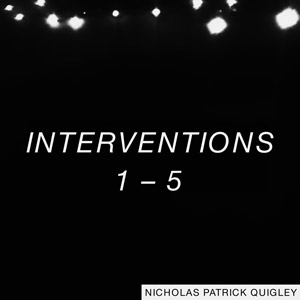Nicholas Quigley began playing the viola in elementary school, picked up the guitar in middle school, and was performing with chamber groups by the time he was an undergrad. So it’s somewhat surprising that his name appears nowhere among the musicians listed as performers on his first album.
Notwithstanding that Quigley (CFA’18) still plays at weddings and various pickup jobs, “To this day, I still don’t think I’m a good violist,” he says, laughing. “Although I have gigs and all these things, I feel like I’m a better throwaway songwriter than a violist.”
His album, titled Interventions 1–5, features music he composed during a burst of creativity last December and January (he had written some pieces earlier but reshaped them significantly in early 2017). “I took winter break to write and compose and polish some things I had, and all of a sudden I had this stuff together,” Quigley says, still sounding surprised.
The album was recorded between February and April, with so many College of Fine Arts students performing that the liner notes resemble a School of Music roll call. In addition to writing the music, Quigley also produced the album. The musicians rehearsed at BU and Quigley secured a borrowed studio in Lowell for the recording sessions.
The music on the album is in two distinct modes, with one half featuring modern chamber music, including a solo viola piece performed by David Mason (CFA’21), and the other half a set of songs for guitar and voice performed by Jon Kohen, a friend of Quigley’s from the University of Massachusetts, Lowell, where the two met as undergraduates. The music is precise and emotional, the songs simple-sounding but intensely, almost painfully, intimate. “Jon’s delivery is everything,” Quigley says.
In addition to Mason, the other BU musicians lending their talents on the record include Brian Cannady (CFA’18), percussion; Alenka Donovan (CFA’18), violin; Kevin Grainger (CFA’15,’17), bassoon; Linnea Marchie (CFA’17), viola; Stuart McDonald (CFA’18), violin; Carolyn Regula (CFA’15,’18) violoncello; and Alexander Thomas (CFA’19), piano and celesta. “They’re all great people,” says Quigley.
The music is decidedly modern and often dark; Quigley cites Philip Glass and Elliot Smith as influences. He calls the pieces “interventions,” he says, because all music is disruptive of your present reality when you really listen.
“I actively avoided naming the music, giving the pieces titles,” says Quigley. “I wanted it to be like a gallery exposition” with different moods and instrumental settings. “I wanted listeners to focus on the experience of hearing the music.”

Image courtesy of Nicholas Quigley
“His compositional works are intricate, and written with specific and deliberate intention,” Kohen says. “Every note serves a purpose that must be fulfilled.”
Composition and recording represents just one facet of Quigley’s interest in the music industry. He applied to college thinking he’d study psychology, but at the last-minute urging of a high school teacher, decided to switch to music. Fortunately, UMass Lowell, where he’d been accepted, allowed him to audition for the music program at the last minute.
“Even though it isn’t a strict conservatory-style setting like BU is, my circle sort of encouraged me” toward classical, Quigley says. Before and after graduation, he played viola in loose-knit chamber groups with fellow students. He launched the Lowell String Quartet (now defunct), which performed at weddings, fundraisers, and recording sessions. He also taught and conducted with the youth in the UML String Project, a collaboration between UMass Lowell and the Lowell public school system, and he still subs as conductor with the orchestra.
At BU, Quigley is pursuing a master’s degree in music education. He hopes to land a job teaching music in a K–12 setting after he graduates next spring and to eventually become a professor of music. He has been working with members of the Boston Youth Symphony Orchestras, and this summer he’ll be teaching at the BU Tanglewood Institute (BUTI). Quigley says his course of study at BU reawakened his interest in the guitar and songwriting, largely abandoned since high school, when he wrote numerous songs for a band he performed with.
Quigley, who earned his undergraduate degree in music business, also runs a one-man consultancy, Q Music & Arts Management, which he describes as an à la carte music and arts management resource for indie artists who either can’t afford or don’t want a full-time manager. He works with musicians and arts groups on their marketing and business practices. The company is also a record label and music publisher, and Quigley released Interventions 1–5 through his company.
Over the past school year, a volunteer job as director of marketing for the Juventas New Music Ensemble also helped inspire him to produce his own album. “Being in that environment—with composers coming in, and we recorded an album that’s supposed to be released this summer—I felt like it was important to do this,” Quigley says of Interventions.
After he finishes his work at BUTI this summer, Quigley intends to embark on a research project under the tutelage of Tawnya Smith, a School of Music assistant professor of music education. He’ll interview what he terms “do-it-yourself musicians” and explore how their creative process was—and wasn’t—shaped by their K–12 music education. Arts policy has also recently become an interest.
Quigley plans to maintain his consultancy and continue composing. “It will be a lifelong pursuit,” he says. He already has plans to record a second full-length album later this year, with a hoped-for release in 2018.
You can listen to a preview of Interventions 1–5 and order the album through Quigley’s website.

















































Hello Joel Brown,
Nice information shared by you and thanks for sharing this useful information with us. We also want to draw your attention towards our competition named as “The ABC Discovers Digital Talent Competition”. The contest is only open to legal residents of the 50 United States and the District of Columbia who are at least 18 years old.
The deadline is” August 10, 2017”
For more information you can go through –
http://usascholarships.com/abc-discovers-digital-talent-competition/
You can also join our Facebook page for the updates. The link http://usascholarships.com/scholarships-for-minority-women/